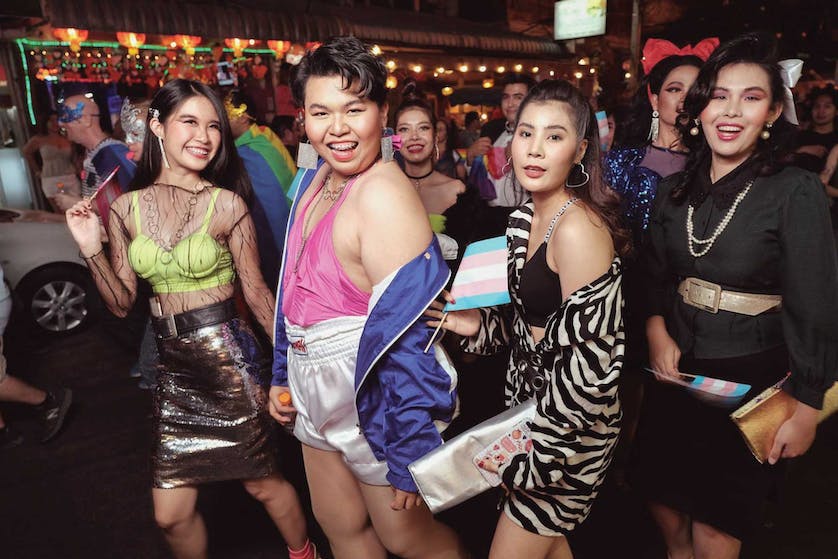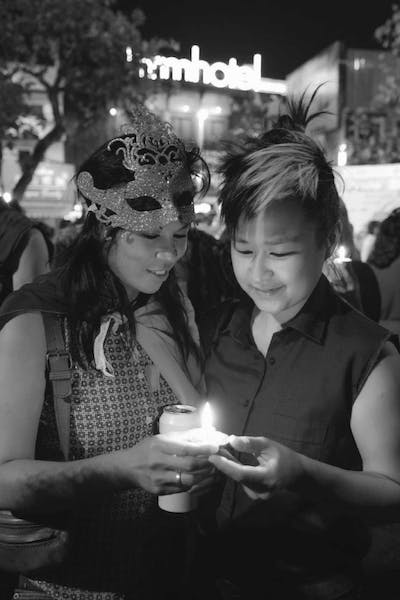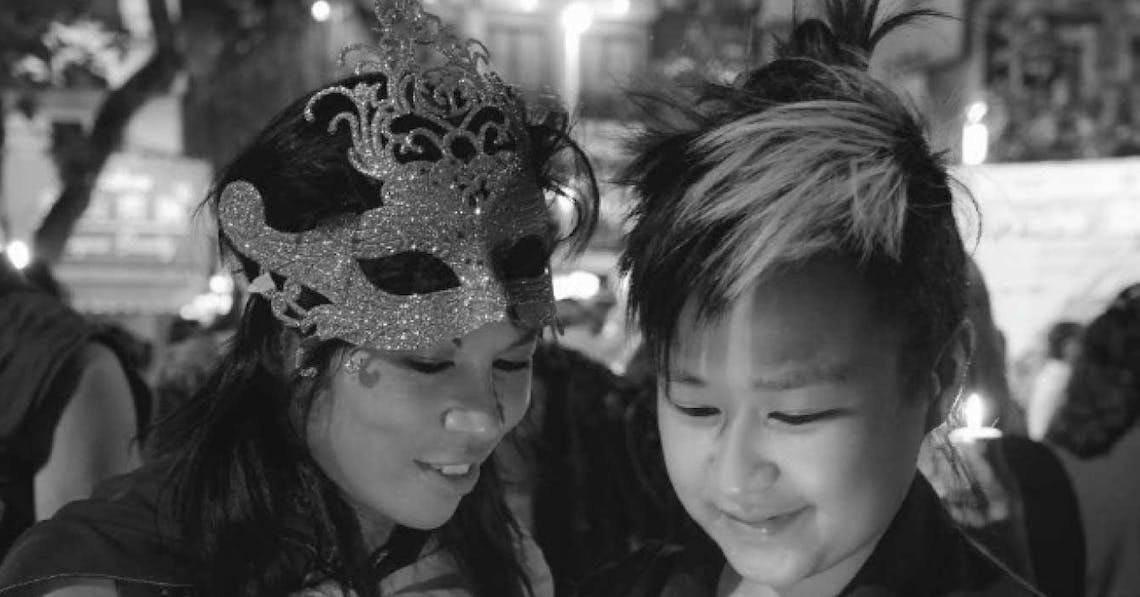If you don’t know about the Chiang Mai Pride story, it is worth taking a moment to read this 2019 article for some important background.
It’s late afternoon and the evening crowd has not yet descended on Le Best Massage, the de facto headquarters of Pride 2020. Several members of the organising team are trickling in, delayed by road cordons helmed by police. They gather on massage chairs and footrests, chatting animatedly and collecting orders for coffee and tea. While I wait for owner and lead pride organiser Sirisak Chaited to dispense with some mundane managerial duties, I chat with NoNie Wachirakanok, who caresses the folds of a silver silk sash resting on her lap. When I first met her, at a talk at CMU on transgender medical tourism in Thailand, her sash was proudly unfurled across her body, topped with a crown declaring her “Chiang Mai Pride Ambassador 2019”. She leans in closer with a cheeky gleam in her eyes, “Why don’t baby boomers accept us? We are not destroying culture or religion, we are expanding it!” By comparison, she relates the development of Thai weaving, whose patterns and techniques have undergone considerable transformations due to technological progress and increased demand. While some expressions of identity and culture are permissible, others are deemed profane. NoNie shows me a picture of her five-year old self in her mother’s arms. Her smile is at once arresting and charismatic. Nonie grew up in a village and had always wanted to be a star, but was held back by bullying and the stigma associated with being a transgender woman. She left her village to pursue her passion for acting. Today she’s a teacher, musician and actress, the first transgender woman in Thailand to be named a brand ambassador for Smirnoff. Her role as Chiang Mai Pride Ambassador has amplified her platform for inclusivity, allowing her to share her experience with people across the north. This clarion call to equality and accessibility is shared by each of the organisers, and as we are ushered upstairs, I wonder how much they could achieve if all the restrictions and prejudice they are fighting were to be removed.
In 2008, Chiang Mai’s LGBTQ community launched a successful LGBTQ Pride, and participants felt gratified to be a glittery, visible part of our culture hub of the north. The following year presented a stark contrast, and participants were met with a threatening level of vitriol. Dr. Natthaporn Maojai, an expert on transgender health and rights at Mplus Foundation recalls the events. “My friends and I were facing these soldiers with guns and we cried.” The risk of violence was too great, and it forced the organisers to shut the event down. The safe space they had claimed in the public sphere just one year previously was no longer safe. Chitsanupong ‘Best’ Nithiwana, an activist and organiser for LGBTQ rights reflects about why the broader community lacked empathy for its LGBTQ members. “In 2008 and 2009 most of the LGBTQ organisations supported HIV/AIDS rights and access to health care, but they were not doing much to help society understand the LGBTQ community, not doing much to help people to understand gender and sexuality.” After the events in 2009, organisers and activists understood the need to turn outwards and not only educate society, but to participate in universal issues affecting everyone, to bring people together.

There’s a set of false dichotomies at work with regard to the general acceptance of LGBTQ people in Thailand. On one level, Thailand markets itself as a global destination for pink dollars (as well as purple yuan, glittery yen, rainbow euros). There is abundant marketing aimed at LGBTQ tourists, and even a “Go Thai, Be Free” campaign by the tourism authority. Three Thai drag performers from RuPaul’s Drag Race Thailand were sponsored by this campaign throughout a tour of North American pride events, including World Pride in New York.
The country’s overt cultivation of the pink baht contrasts with attitudes on the local level. Progress has certainly been made, but according to Dr. Natthaporn, “in private, LGBTQ people are accepted but our rights are limited.” Although gay bars, cabaret shows, and sex workers are part of the economy in Thailand, queer people, and particularly transgender women, are looked down on. They may benefit the economy and contribute to the culture, but stigma and misunderstanding relegate them to the margins of society. For the 2019 edition they even faced push back from the tourism authority. Sirisak Chaited explains.“At first I thought that the Chiang Mai Provincial Tourism Authority of Thailand would be the main organisation supporting touristic enterprises, especially since it has a promotional campaign targeting LGBTQ tourists.” But instead their requests for support were rejected. Sirisak Chaited is bemused when they add, “TAT worried about people’s reactions, and they did not even want to be a co-organiser. This contradicts the overseas image that Thailand is a paradise for LGBTQ.” Despite the institutional inertia, Sirisak expresses gratitude for the personal support lent by TAT’s director.

The organisers didn’t expect many people to come. They hadn’t done a great deal of advertising beyond Facebook, and about 1000 participants had marked themselves as ‘interested’ or ‘going’ to the event. At registration, people assembled together in all their costumed glory, with LGBTQ Christians gathered alongside elders, disabled folks, families and everyone in between. The parade began, and more people joined in, with music and dancing in the streets all the way to Tha Pae Gate, culminating in a solemn candle lighting ceremony commemorating the 2009 violence.
Last year’s Pride exceeded expectations, partly because the organisers shifted the perception of the event as one that exclusively targeted the LGBTQ community. “It’s such a friendly event that everyone felt welcome. This is what made it such a success.” Each activist I spoke with emphasised our universal right to feel safe, to celebrate who we are, and Pride is a part of that. Queer people carved a space for pride in the public sphere with rainbows and glitter. Sirisak states, “we want everyone to see that everyone can show their pride together, because we aim for the equality of the people.”
It’s not just visibility and high numbers that made the event a success. Pride gives its participants a broader platform for change. Alongside her advocacy work at Mplus, Dr. Natthaporn Maojai fights for system-wide change and she walked in the parade as a prospective candidate in the Thai elections. She connects the dots between her queer identity and her visibility in the political realm, advocating for marginalised queer people, as well as being passionately engaged in raising awareness of more universal issues like the impact of air pollution. She makes a point of speaking with people in the city and in the village about their challenges and their rights.
King is a dapper lawyer, whose role in the group is to interact with government officials to secure permits for public gatherings and the use of amplified sound. Everything is organised through the proper channels, but there’s still room to push people’s buttons, and Sirisak is savvy about how far to go. “Our parade is still in line with the old traditions of Chiang Mai, even limiting how we are allowed to express ourselves. Like wearing underwear, going without a bra, letting it all hang out, party like no tomorrow! But due to society and the sacredness of Tha Pae, we couldn’t do that. We’re not alone in society, and we still need to live harmoniously in this society.” Compromise assures the comfort and safety of everyone.
The organisers and I sprawl across the floor on cushions and mats, and a rainbow flag draped on the floor makes the space feel even more inclusive. It’s a cozy arrangement, and I’m immediately welcomed with pad krapow while a joyful Chaited organises mundane tasks and Best video chats from a phone propped up on a pillow. This year’s Pride will be a full day affair, starting with bilingual seminars, culminating in the parade and performances.
Sirisak Chaited is out to change the system’s underlying inequality, “I don’t want this just to be a fun fair, I want this event to be a call for permanent change in human rights in Thailand. This is not just a parade. We also deserve to have rights, such as marriage equality, gender recognition, the provision of transgender prisoner access to hormone therapy, allowing transgender people to dress according to their own gender identity, stopping every type of discrimination, and most importantly, to stop every type of bias and bullying”
At the end of the day Sirisak Chaited wants everyone, whether they can attend or not, “to be proud of themselves, respect themselves and others, because this is the basis of creating equality.”
More information available @CNXPride on facebook
